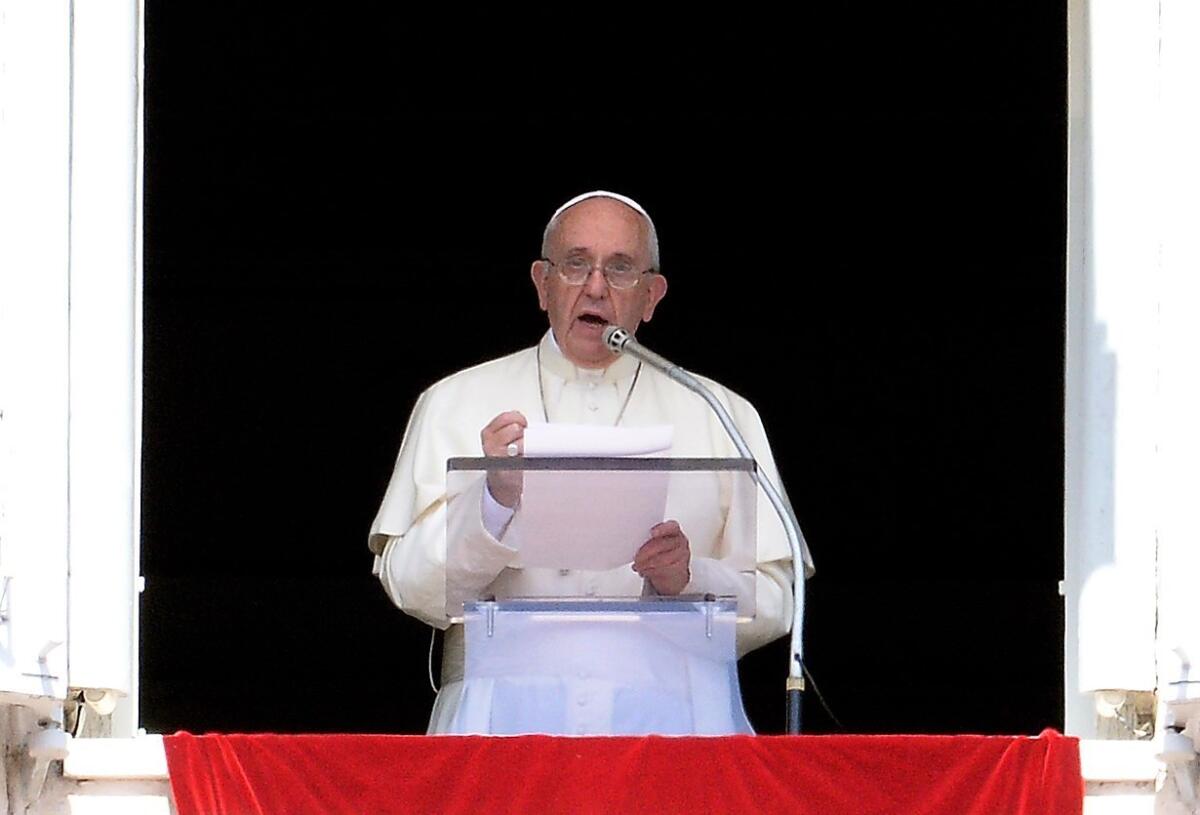Pope Francis shows rare openness on poverty, climate change and more

Pope Francis has pushed for a more welcoming and merciful church, but he has not changed church doctrine on many issues.
- Share via
When Pope Francis makes his first trip the United States this month, he’s expected to address themes that have been major concerns of his papacy — poverty, climate change and religious freedom.
Though Francis has pushed for a more welcoming and merciful church, he has not softened or changed church doctrine on many issues, such as gay marriage or the ordination of women. He will visit the United States from Sept. 22-27, with stops in Washington, D.C., New York and Philadelphia.
Here’s where he stands on key issues:
Abortion
In a September letter, he wrote that during a special holy year starting in December, all priests, not just senior clergy, would be allowed to absolve women who have had an abortion if they seek forgiveness “with contrite heart.”
The move was a further sign of his emphasis on mercy, but Francis did not deviate from church teaching that abortion is a serious sin with grave consequences, including potential excommunication. “The tragedy of abortion is experienced by some with a superficial awareness, as if not realizing the extreme harm that such an act entails,” he wrote.
But of women who have had abortions, he said: “I am well aware of the pressure that has led them to this decision. I know that it is an existential and moral ordeal. I have met so many women who bear in their heart the scar of this agonizing and painful decision.”
Women
Francis has praised the “feminine genius” and said the role of women in the church is more than motherhood, once saying that “women in the church are more important than bishops and priests.”
The pope has suggested that the church needs to do more to harness the energy and compassion women bring to Catholicism. The church, he said, has yet to come up with “a deep enough theology of womanhood.”
NEWSLETTER: Get the day’s top headlines from Times Editor Davan Maharaj >>
Talking with reporters during a flight from Rio de Janeiro to Rome in 2013, he said of the church and women: “All we tell them is they can do this and they can do that.”
Although he has called for a greater role for women, he stands by the all-male priesthood, saying the door to women’s ordination is “closed.”
Gay marriage
Pope Francis famously suggested in 2013 that he wouldn’t judge gay priests for their sexual orientation. “If someone is gay and he searches for the Lord and has goodwill, who am I to judge?” he asked.
The remark, also made on the flight from Brazil to Rome, left many wondering whether the pope had defied Roman Catholic Church teachings. But Francis did not deviate from doctrine or change the Vatican’s view — his comments were more about reaching out to a changing society than giving gay marriage a stamp of approval.
Asked later about his position on homosexuality, Francis said his in-flight comment was merely a reflection of Church’s inclusive teachings. The pope then asked a question of his own.
“When God looks at a gay person, does he endorse the existence of this person with love, or reject and condemn this person?” he asked. “We must always consider the person.”
Climate change
In Laudato Si, his powerfully worded encyclical issued in June, Pope Francis chastised those who would deny a human connection to climate change. He declared that the planet was indeed growing warmer and that the dangerous trend was due largely to a culture of instant gratification.
People have grown increasingly self-obsessed, Francis said, ever more distant from nature and alarmingly preoccupied with technological novelty.
“Doomsday predictions can no longer be met with irony or disdain,” Francis wrote. “We may well be leaving to coming generations debris, desolation and filth. The pace of consumption, waste and environmental change has so stretched the planet’s capacity that our contemporary lifestyle, unsustainable as it is, can only precipitate catastrophes.”
A “disordered desire to consume more than what is really necessary” as well as a “use and throw away culture” were at the root of the problem, he said.
Income inequality
As a Jesuit priest in Buenos Aires, Francis often preached in the city’s shantytowns. As pope, he’s continued his message of social inclusion and solidarity with the poor by railing against the “idolatry of money.”
The Argentine pontiff has asked businessmen and politicians “not to yield to an economic model which is idolatrous, which needs to sacrifice human lives on the altar of money and profit.”
Such messages have led to accusations that the pope is a Marxist, but Francis maintains that he is not a communist and that he is simply preaching the Gospels.
“Putting bread on the table, putting a roof over the heads of one’s children, giving them health and an education — these are essential for human dignity,” Francis said earlier this year.
Immigration
Francis has denounced the “inhuman” conditions immigrants face and has urged communities not to judge others based on stereotypes.
During the annual World Day for Migrants and Refugees last year, he called on people to change their attitudes toward immigrants and move away from “defensiveness and fear, indifference and marginalization.” Those thoughts, he said, are “typical of a throwaway culture.”
“Many people forced to emigrate suffer, and often, die tragically. Many of their rights are violated; they are obliged to separate from their families and, unfortunately, continue to be the subject of racist and xenophobic attitudes,” he said. “This challenge demands the attention of the entire international community so that new forms of legal and secure migration may be adopted.”
Twitter: @sarahparvini
More to Read
Sign up for Essential California
The most important California stories and recommendations in your inbox every morning.
You may occasionally receive promotional content from the Los Angeles Times.











